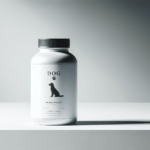
Omega-3 fatty acids are essential for your dog’s health, playing a vital role in their overall well-being, no matter the breed or age. These powerful nutrients help support joint health, maintain a shiny coat, and promote healthy skin. By incorporating omega-3 supplements specifically designed for canines into your dog’s diet, you can further enhance their organ function, support normal inflammatory responses, and overall health. Many health experts and veterinarians recommend these supplements to ensure your furry friend remains in the best possible condition, providing you peace of mind that you’re giving your loyal companion optimal care. Have you ever wondered why Omega-3 fatty acids are such a big deal when it comes to your dog’s health? If you’re a responsible dog owner, seeking to offer the best care for your furry friend, then you’re in the right place. Let’s dive deep into the importance of Omega-3 fatty acids for your dog’s overall well-being and uncover how you can best incorporate them into your pet’s diet.

What Are Omega-3 Fatty Acids?
Defining Omega-3 Fatty Acids
Omega-3 fatty acids are essential fats, meaning your dog’s body cannot produce them on its own. They need to be obtained through a diet or supplementation. The three main types crucial for canine health are EPA (eicosapentaenoic acid), DHA (docosahexaenoic acid), and ALA (alpha-linolenic acid).
Sources of Omega-3 Fatty Acids
You can find Omega-3 fatty acids in various sources like fish oil, flaxseed oil, and certain types of algae.
| Source | Type of Omega-3 |
|---|---|
| Fish Oil | EPA, DHA |
| Flaxseed Oil | ALA |
| Algae Oil | DHA |
While fish oil is a popular and highly effective source for dogs, flaxseed oil, and algae oil can also offer benefits, particularly for pets on a plant-based diet.
Why Are Omega-3 Fatty Acids Important?
Supporting Skin and Coat Health
One of the most visible benefits of Omega-3s can be seen in your dog’s skin and coat. These fatty acids help maintain a glossy coat and can alleviate issues like dry, flaky skin, and dandruff.
Promoting Joint Health
As dogs age, they often experience joint issues. Omega-3 fatty acids can offer natural support for joint health, making them a popular addition to joint supplements alongside glucosamine and chondroitin. They can help reduce inflammation and support overall mobility.
Enhancing Brain and Eye Development
Omega-3s are crucial for the development of a healthy brain and eyes, particularly in puppies but also in maintaining cognitive function in senior dogs. DHA, in particular, plays a significant role in neural development.
Supporting a Healthy Heart
Just like in humans, Omega-3s contribute to cardiovascular health in dogs. They help maintain a normal heart rhythm, support blood vessel function, and can even reduce the risk of heart diseases.
Boosting Immune System
A robust immune system is essential for your dog’s overall health. Omega-3 fatty acids can help support strong immunity, aiding in quicker recovery from illnesses and better overall health.
How to Add Omega-3 Fatty Acids to Your Dog’s Diet
Commercial Dog Foods
Many high-quality commercial dog foods already include Omega-3 fatty acids. Look for labels that mention fish oil or flaxseed oil as ingredients.
Omega-3 Supplements
If you prefer giving supplements, there are plenty of Omega-3 supplements designed specifically for dogs. These often come in forms like soft chews, capsules, or as a liquid that you can mix into your dog’s food.
Natural Sources
In addition to commercially available options, you can get Omega-3s into your dog’s diet through natural sources. Adding a bit of cooked salmon or a sprinkle of ground flaxseed to their meal can make a big difference.
How Much Omega-3 Does Your Dog Need?
Consulting Your Veterinarian
It’s always best to talk to your vet before starting any supplementation. The dosage can vary depending on your dog’s breed, age, and specific health needs.
General Guidelines
While specific needs can vary, a general guideline is approximately 20-55 mg of EPA + DHA combined per pound of body weight per day.

Common Health Concerns Addressed by Omega-3 Fatty Acids
Joint Problems
Dogs experiencing joint issues like arthritis can greatly benefit from Omega-3 supplements. These fatty acids help reduce inflammation and support hip and joint health.
Skin Conditions
Omega-3s are effective in treating various skin conditions such as allergies, hot spots, and dermatitis. They help soothe the skin and promote a healthy skin barrier.
Cognitive Decline in Senior Dogs
Older dogs often face cognitive challenges. DHA, in particular, has been shown to support cognitive function, helping to keep your senior dog sharp and aware.
Cardiovascular Issues
Heart diseases are common in many dog breeds, and Omega-3 fatty acids can help support a normal heart rhythm and blood flow, reducing the risk of cardiovascular issues.
Quality Matters: Choosing the Right Omega-3 Product
Look for NASC Quality Seal
When choosing Omega-3 supplements, look for the NASC (National Animal Supplement Council) Quality Seal. This ensures the product meets high standards of quality and safety.
Opt for High-Quality Ingredients
The best supplements use high-quality, sustainably sourced ingredients. Look for Omega-3 supplements that specify the source of their fish oil (wild-caught fish are generally best).

Integrating Omega-3 with Other Dog Vitamins and Supplements
Pairing with Joint Supplements
Combining Omega-3s with joint supplements like glucosamine and chondroitin can offer comprehensive support for your dog’s hip and joint health.
Balancing with Multivitamins
A multivitamin that includes Omega-3s can be a good option to ensure your dog gets a well-rounded nutrient profile, supporting overall health and well-being.
Supporting Digestive Health
Probiotics are another excellent supplement that can work in tandem with Omega-3s to maintain a healthy gut, which is crucial for your dog’s digestive health and overall well-being.
Conclusion
All in all, Omega-3 fatty acids are undeniably essential for your dog’s health, contributing to everything from skin and coat condition to joint health and cognitive functions. By understanding the role these essential fats play and how to effectively incorporate them into your pet’s diet, you are taking a significant step towards ensuring your dog leads a happy, healthy life.
Remember, it’s always best to consult your veterinarian before making any significant changes to your pet’s diet or starting new supplements. With the right approach, you can provide your canine companion with the necessary nutrients for optimal health and well-being.
So, next time you see your dog thriving, with a shiny coat and boundless energy, you’ll know that the Omega-3 fatty acids in their diet are playing their part in keeping your furry friend at their best.







